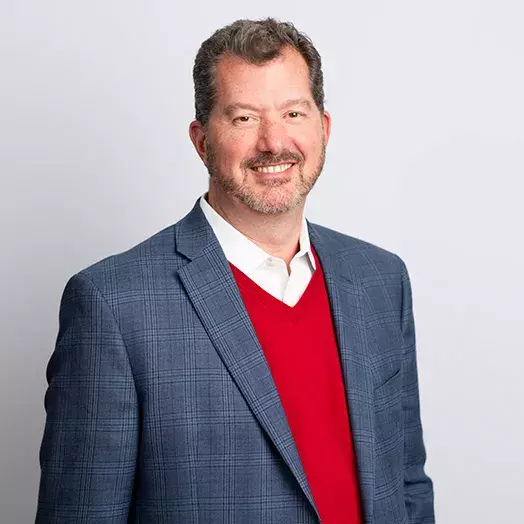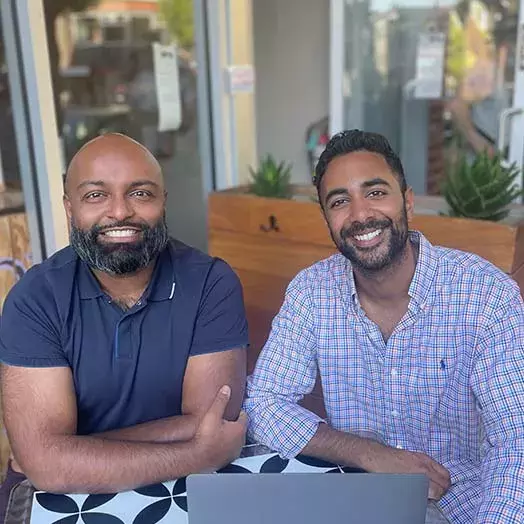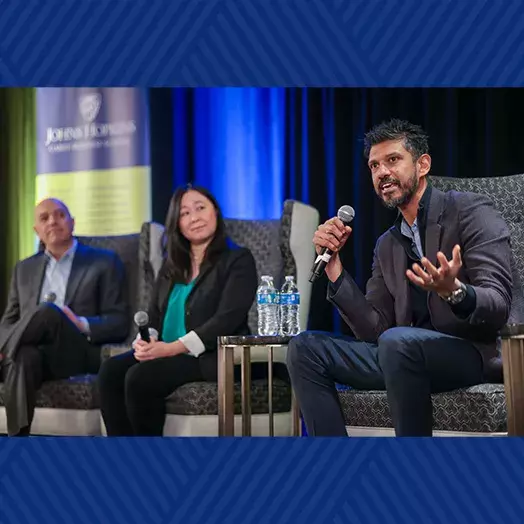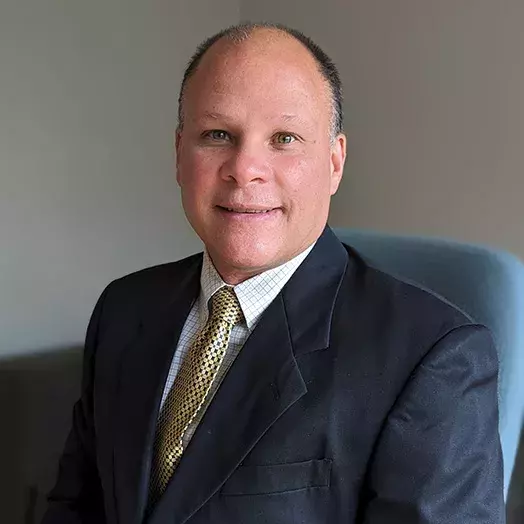Alumnus Bill Enright (MS Business Management ’96) says no matter what the profit margin is, saving lives is the No. 1 goal in biotech.

Leading with humanity nets the world’s most-used COVID-19 vaccine
When it comes to leading with unwavering humanity, humility is a bigger factor than we might realize. Ironically, it can also help foster tremendous success.
Vaccitech CEO Bill Enright (MS Business Management ’96), a 2022 Johns Hopkins University Alumni Association Global Achievement Award recipient, has seen that happen first-hand. As the head of a small but mighty biotechnology company that focuses on immunotherapies, he’s the business leader behind the most-used COVID-19 vaccine in the world. He’d been at the company less than a year when the pandemic prompted action.
“A lot of people have spent their career in biotech and never got a product to market,” Enright said. “To be honest, we had a really small part in COVID immunotherapy, but when we started seeing pre-clinical studies that looked like it was going to work and it mirrored some of our data we had, then the goal was to get it to a Big Pharma partner who had the expertise to get it to market more rapidly than we could.”
Vaccitech developed the AstraZeneca version of the vaccine, then licensed it to that company through the University of Oxford. Though it wasn’t used in the U.S., it was distributed across 185 countries, including those hardest hit by the virus, like India, Brazil, and Mexico. According to Oxford’s Our World in Data, just over 149 million doses of that specific vaccine had been delivered into arms by early October 2022.
The business of biotech
Enright said Vaccitech and Oxford licensed the immunotherapy because it was the best way to get the vaccine his 40-person company had developed out into the world. It was the unwaveringly humane decision to make, but it meant swallowing a slightly bitter pill.
“We’ve had $32 million in royalties, where other companies are getting multibillion dollars of revenue,” Enright explained. “But I think it was the right thing to do at that time for us as an organization. We did fine. We were able to raise money to keep the company moving, we got the company public, there were a lot of things that benefited the company because of our involvement.”
So doing the right thing didn’t make the most money, but it turned out well for Vaccitech. Its IPO on April 31, 2021 yielded $110.5 million in its opening week.
Leading through history
Developing the COVID-19 vaccine was a 24-hour job for Vaccitech’s employees, but Enright said he didn’t have to do a lot of cheerleading.
“It’s great working with a team of individuals who have common goals. People just did it,” he said. “My job was more about making sure other people took time to sleep, and things like that. Everybody was just united in the effort. I worked more on coordination issues, strategies, ‘How are we going to do this?’”
Since developing the drug, he said, there’s been very low turnover, and Vaccitech is in high growth mode.
“I think one thing I’m pretty passionate about is bringing people in who are way smarter at what they do than I am and try to get them the resources so they’re able to do their job,” Enright said. “Along the way, you help them with their careers. You look at the people you’re mentoring within companies and try to give them what they need to develop and become leaders in the industry and make sure there’s a legacy here that will continue to provide innovative products.”
Connecting to Carey
Helping people with their careers is just one of the ways Enright still connects with Carey, and one of the reasons he received the 2022 JHU Alumni Association Global Achievement Award. He judges business plan competitions, mentors students, talks with individuals who reach out to him via OneHop. He’s made presentations on some health care panels, and he served on the Dean’s Alumni Advisory Board for a decade. He was also on the JHU Alumni Council for six years. For Enright, it all ties back to what his degree did for him, and why he wants to help do that for others.
“It was later in my career when I said, ‘The importance of this degree to where I am now is huge.’ So, I wanted to give back and that’s why I got involved and why I stay involved. I tell people the degree was about learning different languages: I learned how to speak finance and I learned how to speak marketing. It really turned my career from being a bench scientist to becoming a CEO and ringing the bell at NASDAQ twice at two companies and impacted a lot of lives with growth in those companies.”
What to Read Next

career outcomes
A joint venture: MBA alums co-found stealth startup to tackle the gaps in patient equityWhat’s next for global health
Enright said much of what’s happening in the immunotherapy industry is innovative. When it comes to global health, malaria and tuberculosis are still the biggest killers, and there are what he called “huge strides” in combating them. There are also major advances in oncology, including potential mRNA-based vaccines.
“For Vaccitech, we’re using the T-cell arm of the immune system to try and treat diseases that we think T-cells are important for – chronic infectious disease like hepatitis B, HPV and cancer, to bolster immune tolerance. In celiac disease and potentially multiple sclerosis, there are a lot of really interesting applications for the platform that we have.”
Excitement doesn’t guarantee success. Enright said 90 percent of what biotech companies do fails due to project management, financing, clinical trial challenges, or other business issues. Developing drugs is a very hard business. But Enright said experience means something, and providing things that do work, based on that experience, is something he wants to continue doing, for the business of health and unwavering humanity.


